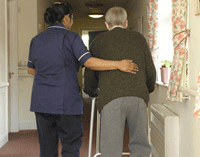
The status of care home managers and staff must be boosted to improve dignity for older people, an inquiry into the issue has concluded.
Care home managers should be seen as “experts in their field” and should have access to proper training and support to deal with their demanding roles, said the commission on improving dignity in care in its interim report, published today.
In addition, a Care Quality Forum should be set up to boost the status of staff in care homes and examine issues including pay, qualifications and professional regulation, as a first step to the creation of a professional College of Care, similar to the College of Social Work.
Fundamental change is needed to improve dignity for older people in hospitals and care homes and the quality of staffing was key to achieving this aim, concluded the commission, set up by Age UK, the Local Government Association and the NHS Confederation.
However, it said care home staff were often poorly paid, lacked professional status and had too little access to training, while managers could feel isolated and that they had little back-up in dealing with issues such as end-of-life care.
It called for providers to invest in support and regular training for managers, backed by sufficient funding from commissioners, and urged the creation of a network to help managers share ideas with each other. This idea has been backed by a campaign to raise the status of registered managers by the Social Care Association, the National Skils Academy for Social Care and the National Care Forum.
The commission also said staff should be recruited on the basis of positive attitudes to residents, should have regular appraisals, strong on-the-job training and a career structure that recognised good performance. However, it also called on staff to take “personal responsibility” for ensuring dignity in care and to challenge poor practice among their colleagues.
Among other recommendations, it called for care home providers to have effective whistleblowing procedures for staff.
Many of the issues raised in the report will be addressed through the forthcoming leadership strategy for adult social care, said the National Skills Academy for Adult Social Care. This will provide employers with a way for assessing the behaviour of staff and identify relevant training to address gaps and a leadership qualities framework for organisations to assess their strengths and weaknesses.
“We believe it is only through investing in leadership development that organisations can meet and move beyond compliance requirements towards excellence,” said skills academy chief executive Diane Lawson.
- Go to You Care for the latest news and practice in residential and domiciliary care.
- Have your say on residential or domiciliary care issues on our dedicated forum.
Related articles
‘Fundamental change needed to improve elderly care’


 ‘Dear Sajid Javid: please end the inappropriate detention of autistic people and those with learning disabilities’
‘Dear Sajid Javid: please end the inappropriate detention of autistic people and those with learning disabilities’ Ofsted calls for power to scrutinise children’s home groups
Ofsted calls for power to scrutinise children’s home groups Seven in eight commissioners paying below ‘minimum rate for home care’
Seven in eight commissioners paying below ‘minimum rate for home care’ Children and young people with SEND are ‘valued and prioritised’ in Wiltshire, find inspectors
Children and young people with SEND are ‘valued and prioritised’ in Wiltshire, find inspectors 
 Facebook
Facebook X
X LinkedIn
LinkedIn Instagram
Instagram
Comments are closed.